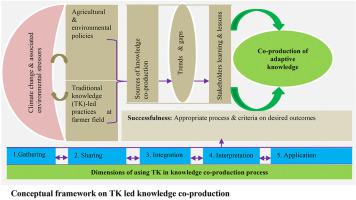Journal of Environmental Management ( IF 8.7 ) Pub Date : 2021-01-08 , DOI: 10.1016/j.jenvman.2020.111679 Ranjay K. Singh , Anshuman Singh , Kerstin K. Zander , Supriya Mathew , Arvind Kumar

|
Poor access to external resources, and a lack of affordable technologies compatible with socio-economic and ecological settings of rural livelihoods lead to high vulnerability of subsistence farmers to climate change and associated environmental stressors. Traditional knowledge (TK) plays a pivotal role in improving the adaptive capacity of such farmers to cope with these stressors. In India, most of the policies aiming to improve farmers' adaptive capacity are based on a top-down approach and barely consider farmers' TK. Policies can be made more inclusive by mainstreaming stakeholders' perspectives, an approach termed as knowledge co-production. Our study uses a knowledge co-production framework to (i) assess the current state of emphasis on TK and knowledge co-production processes in Indian policies on agricultural adaptation to climate change and associated environmental stressors, (ii) understand the status of TK-led knowledge co-production at the practice level, and (iii) assess the successes and gaps in incorporating TK in agricultural adaptation at the policy and practice levels to manage these stressors. Based on a systematic literature review, we found that despite emphasis on integration of TK, no Indian policy was successful in terms of stakeholder participation and in covering various dimensions of knowledge co-production. Most of the policies covered either two (knowledge gathering and application) or three (gathering, integration and application) dimensions. The term TK was also not clearly defined and it was unclear how to mainstream it into the process for successful outcomes. Co-production process was adjudged to be fairly successful at the practice level in some of the sectors (e.g., management of soil and water resources) where most of the dimensions were covered and stakeholders participated in various steps of co-production. There were significant differences in the success of co-production within (e.g., crop varieties) and between (e.g., crop and natural resource management) the sectors. We found a considerable gap at policy and practice levels on success of knowledge co-production. Insights from the study could help policy-makers to improve policies for the agricultural sector to better adapt to climate change and associated environmental stressors through the recognition and integration of farmers' TK.
中文翻译:

衡量知识联产的成功过程以管理气候变化和相关的环境压力:适应政策和做法以支持印度农民
缺乏外部资源,缺乏与农村生计的社会经济和生态环境相适应的负担得起的技术,导致自给自足的农民极易受到气候变化和相关环境压力的影响。传统知识(TK)在提高此类农民应对这些压力的适应能力中起着关键作用。在印度,大多数旨在提高农民适应能力的政策都是基于自上而下的方法,几乎不考虑农民的传统知识。通过将利益相关者的观点主流化,可以使政策更具包容性,这种方法被称为知识联合生产。我们的研究使用知识共同生产框架来(i)评估印度关于农业适应气候变化的政策和相关环境压力因素中对传统知识和知识共同生产过程的重视现状;(ii)了解传统知识的现状领导在实践层面的知识联合生产,以及(iii)在政策和实践层面评估将传统知识纳入农业适应以管理这些压力源的成功和差距。根据系统的文献综述,我们发现尽管强调传统知识的整合,就利益相关者的参与以及涵盖知识联合生产的各个方面而言,印度的政策都没有成功。大多数政策涵盖了两个(知识收集和应用程序)或三个(采集,整合和应用)尺寸。传统知识一词也没有明确定义,也不清楚如何将其纳入成功成果的主流。在某些部门(例如土壤和水资源管理)的实践水平上,联合生产过程被认为是相当成功的,这些部门涵盖了大多数方面并且利益相关者参与了联合生产的各个步骤。部门内部(例如作物品种)以及部门之间(例如作物和自然资源管理)的联合生产成功率存在显着差异。我们发现,在知识和联合生产成功的政策和实践水平上存在很大差距。



























 京公网安备 11010802027423号
京公网安备 11010802027423号